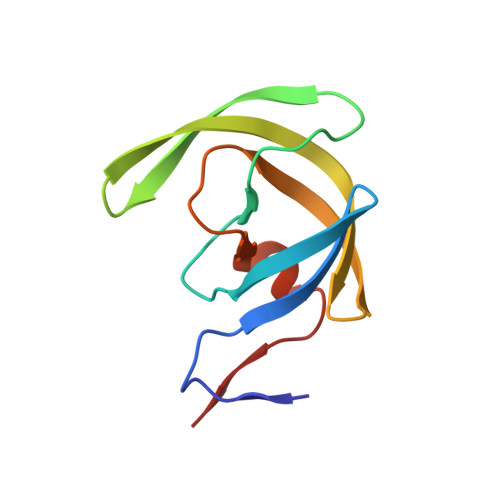Potent new antiviral compound shows similar inhibition and structural interactions with drug resistant mutants and wild type HIV-1 protease.
Wang, Y.F., Tie, Y., Boross, P.I., Tozser, J., Ghosh, A.K., Harrison, R.W., Weber, I.T.(2007) J Med Chem 50: 4509-4515
- PubMed: 17696515
- DOI: https://doi.org/10.1021/jm070482q
- Primary Citation of Related Structures:
2QCI, 2QD6, 2QD7, 2QD8, 2Z4O - PubMed Abstract:
The potent new antiviral inhibitor GRL-98065 (1) of HIV-1 protease (PR) has been studied with PR variants containing the single mutations D30N, I50V, V82A, and I84V that provide resistance to the major clinical inhibitors. Compound 1 had inhibition constants of 17-fold, 8-fold, 3-fold, and 3-fold, respectively, for PR(D30N), PR(I50V), PR(V82A), and PR(I84V) relative to wild type PR. The chemically related darunavir had similar relative inhibition, except for PR(D30N), where inhibitor 1 was approximately 3-fold less potent. The high resolution (1.11-1.60 Angstrom) crystal structures of PR mutant complexes with inhibitor 1 showed small changes relative to the wild type enzyme. PR(D30N) and PR(V82A) showed compensating interactions with inhibitor 1 relative to those of PR, while reduced hydrophobic contacts were observed with PR(I50V) and PR(I84V). Importantly, inhibitor 1 complexes showed fewer changes relative to wild type enzyme than reported for darunavir complexes. Therefore, inhibitor 1 is a valuable addition to the antiviral inhibitors with high potency against resistant strains of HIV.
- Department of Biology, Molecular Basis of Disease, Georgia State University, Atlanta, Georgia 30303, USA.
Organizational Affiliation:




















